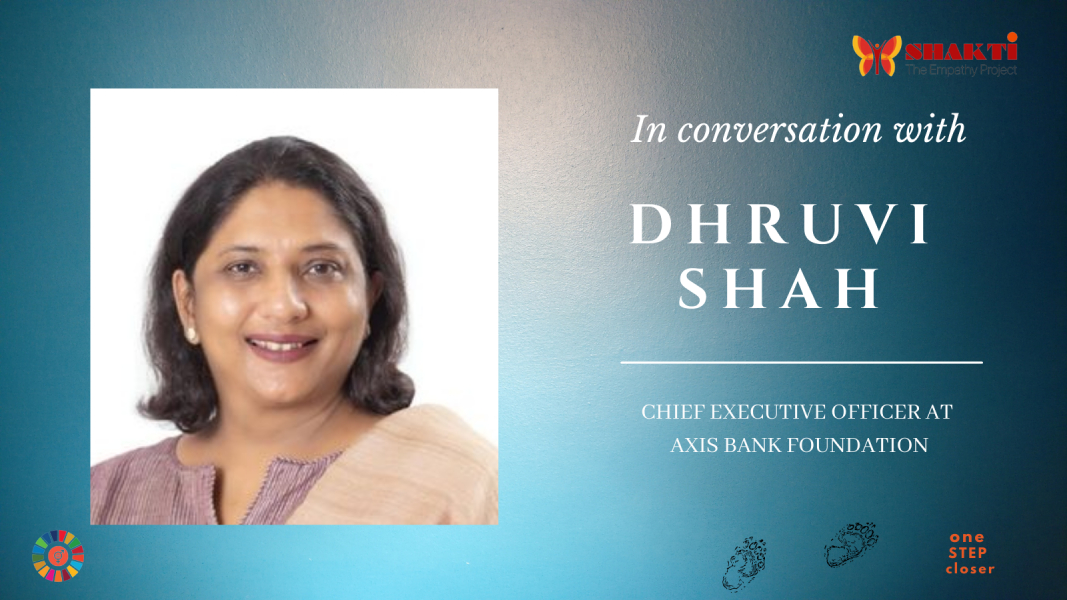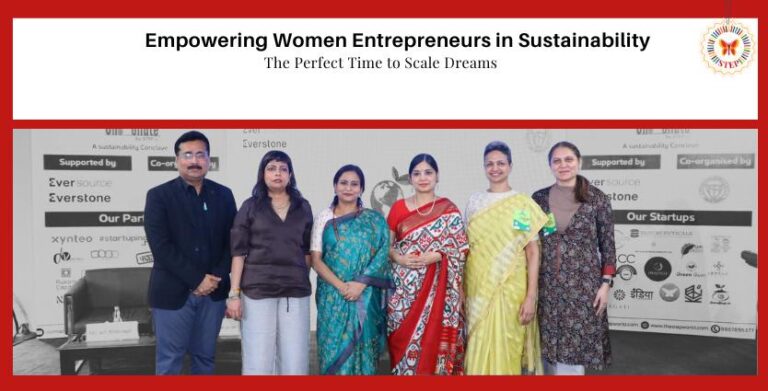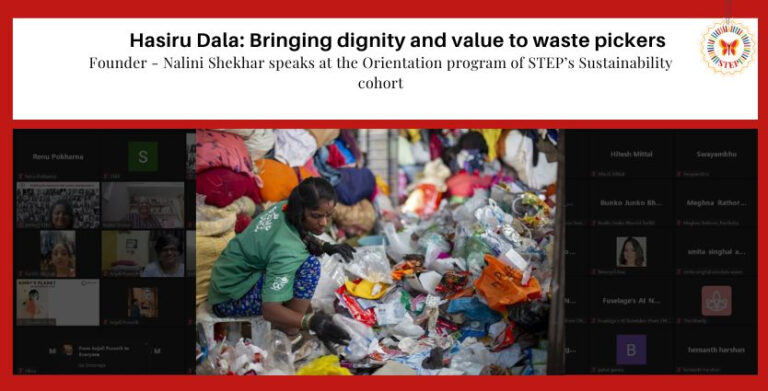In Conversation with Dhruvi Shah
“CSR or Corporate Social Responsibility refers to practices and policies undertaken by corporations for a positive influence on the world. Axis Bank Foundation aims to work with rural communities to build their capacities and create self-sustaining ecosystems that thrive,” says Dhruvi Shah, Executive Trustee, and CEO of Axis Bank Foundation (ABF) which aims to create sustainable livelihoods for rural communities in India by enhancing and diversifying their streams of income.
The Journey from banking to development sector
Before joining the Foundation, Dhruvi worked with ABN AMRO Bank N.V for 18 years. She managed corporate and private banking clients across asset and liability operations for retail, trade and treasury products before progressing to handling the microfinance loan portfolio for South India.
She also aided the ABN AMRO Foundation India in setting up a technical assistance programme under which she guided microfinance and livelihood-support organizations.
During this stint, Shah travelled extensively through the hinterlands of India. She experienced the lives and livelihoods of rural India along with understanding the gaps and cultural nuances that drive economic growth in these areas. Dhruvi shares, “When you first-hand experience rural India; truly get exposed to their way of life, you are taken aback by the sheer depth and expanse of the challenges they face. Through my travels, I learned it was a time for learning new things and unlearning the older thought processes, and I loved the adventure.”
This marked Dhruvi’s transition towards the development sector. She took up the responsibility of ABN AMRO’s ‘Sustainable Development and Not-for-Profit Management vertical in 2008—ABN AMRO Bank N.V. was subsequently rebranded as The Royal Bank of Scotland (RBS) N.V. She designed their employee engagement platform and outreach Programmes.
Leading the Sustainable Livelihoods Program at Axis Bank Foundation
Dhruvi translated her deep understanding of corporate banking and microfinance to manage the operations of ABF in its efforts to build resilience in communities all over India. Under her leadership, the Foundation’s programmes have served as a shelter in the storm for these communities as they struggled to survive the economic and social impact of the COVID-19 pandemic. Before taking up the role of CEO in November 2020, Dhruvi had been the Head of Programs at ABF since 2016.
“Rural communities are at the bottom of the economic pyramid. Establishing a steady livelihood is more challenging in rural areas as opportunities and exposure is limited. It needs a more driven approach to bring about change in rural areas, as capacities, education, awareness, and access to facilities are low,” Dhruvi explains.
There is a need to strengthen the ecosystem towards inclusive growth for all. There are numerous social issues and belief systems that have to be addressed first, and for that, trust with the community has to be built.
Axis Bank Foundation’s current programs are aimed towards strengthening and increasing farm productivity, improving natural resource management, providing alternate income-generating options, and increasing employability and entrepreneurial skills. This multi-faceted approach towards livelihoods enables rural communities to not just meet their basic needs but leverage government programs, gain access to credit and build their capacities to be agents of change in their own communities.
To date, ABF has impacted close to 1.8 million households through its various initiatives. The Foundation partnered with 27 like-minded organizations across 25 states and 10,982 villages in India in 2021. The Foundation intends to play a more intentional role in rural livelihoods and promote knowledge sharing among stakeholders.
Enabling livelihoods during the lockdown
The Covid-19 lockdown was a difficult time for rural communities. Markets closed down, a mass migration took place, a shortage of livelihood opportunities and there was no market for their products. As people migrated back from cities, there was a need to develop work opportunities to accommodate them along with an urgency to spread awareness about masks, social distancing, and basic health measures. “We prioritized the needs of the community and supported our on-ground partners in enabling access to ration, setting up isolation centres, strengthening health infrastructure, ensuring job cards for work under MGNREGA, etc. We closely collaborated with the community during those dark days to render our support in every possible way,” Dhruvi shares.
Launching the Book of Aspiration
Dhruvi has also co-authored a book with Ved Arya (Founder of SRIJAN and the Buddha Fellowship) that features the life stories of social leaders with the aim to inspire young Indians to take a step towards shaping a better society. The book was very well received and a second volume will be released later this year.
Pursuing a career in the social space
Dhruvi believes that the development sector is a constantly evolving space, and one cannot become stagnant here. Shah advises people who want to join the segment to be clear about the role they want to play, the learning one wants to gain, and have less aspiration for wealth. “One also needs to be inclusive of people of all kinds, give equality to them, be more conscious of the society, and the difference one can make,” says Dhruvi.
Shah urges people to volunteer in whatever way they can as it is the first step. “There is always something that we can influence or do to make a difference,” she adds as she closes the conversation.



